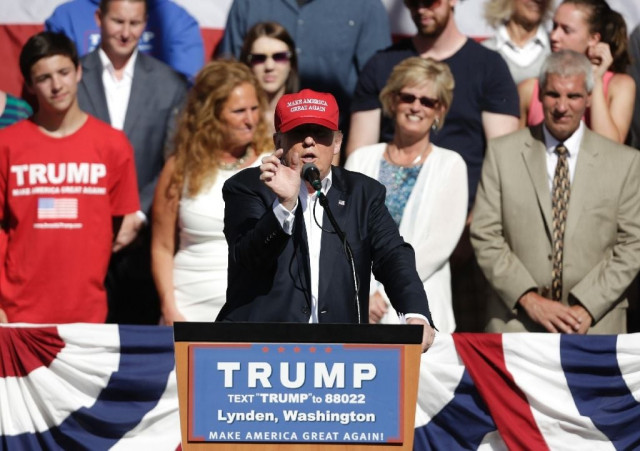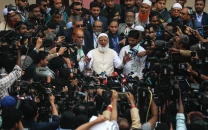Trump, Republican leaders aim to make peace in Washington
A handful of pro-Trump House Republicans met with Ryan Wednesday to urge him to back the billionaire

Concerns have trickled down to many in the congressional rank and file who fear a Donald Trump nomination could doom Republican efforts to defeat Democrat Hillary Clinton in November. PHOTO: AFP
Ryan, the top-ranked Republican currently elected to public office, dropped a bombshell and triggered soul-searching within a fractured party last week when he said he was "just not ready" to support Trump as the flagbearer.
Donald Trump mixes up ‘9/11’ with ‘7/11’
The concerns have trickled down to many in the congressional rank and file who fear a Trump nomination could doom their efforts to defeat Democrat Hillary Clinton in November and hold the majority in the Senate and House of Representatives.
With the party divided, Trump and the Republican establishment aim to put differences aside ahead of what is expected to be a brutal campaign battle against Clinton.
"The goal here is to unify the various wings of the party around common principles," not bandage deep wounds and move on, Ryan said Wednesday.
"After coming through a very bruising primary, which just ended like a week ago, to pretend we're unified without actually unifying, then we go into the fall at half strength."
Ryan, who at 46 is a generation younger than 69-year-old Trump, took up the speakership last October pledging to modernise the party's image and reach out to minority groups that traditionally vote Democratic.
But many GOP luminaries have watched aghast as the provocative New York real estate mogul Trump has insulted Mexicans, demeaned women and called for a ban on Muslims entering the United States.
Trump is expected to meet Ryan at 9:00 am (1300 GMT) Thursday at party headquarters in Washington. He will be looking for more than just a photo op.
"I have a lot of respect for Paul and I think we're going to have a very good meeting," Trump told Fox News on Tuesday.
Halting ‘radical Islam’ must be a top US priority, says Donald Trump
"If we make a deal, that will be great," he added later. "And if we don't, we will trench forward like I've been doing and winning, you know, all the time."
Trump also meets Reince Priebus, the powerful chairman of the Republican National Committee that helps coordinate financing for the party nominee's presidential campaign. Priebus has called for Republicans to unite behind Trump.
Later that morning, he meets with top Senate Republican Mitch McConnell and the chamber's other GOP leaders.
While many upper echelon party figures including 2012 nominee Mitt Romney and the two Bush presidents are opposed to Trump, there were signs Wednesday of a growing move to unite behind Trump.
The chairman of seven House committees endorsed the tycoon, saying in a statement Trump posted on his Facebook page that "it is paramount that we coalesce around the Republican nominee... and maintain control of both the US House of Representatives and the US Senate".
On Tuesday, Republican Senator James Inhofe criticised Ryan's statements, saying Trump "is the nominee, he's going to be working together and have to establish a workable relationship, and I think they will."
"But that's not a good way to start," he added.
A handful of pro-Trump House Republicans met with Ryan Wednesday to urge him to back the billionaire.
There is fence-mending to be done. Ryan bristled in December when Trump proposed his Muslim ban. "This is not conservatism," he warned.
Trump said he felt "blindsided" by Ryan's move last week, telling NBC Sunday that "if he doesn't want to support me, that's fine".
Although some Republicans called for a genuine conservative candidate to challenge Trump and Clinton in November, that prospect has dimmed.
"Most of my members believe he's won the nomination the old-fashioned way," said McConnell, who after months of expressing concern about how a Trump nomination might affect Republican efforts to hold the Senate, has expressed support for him.
‘Misguided vision’: Nisar gets wide media coverage over Trump criticism
"We know that Hillary Clinton will be four more years of Barack Obama. I think that's going to, in the end, be enough to unify Republicans across the country."
Some anti-Trump die-hards, including Senator Lindsey Graham, argue that Republicans in tough re-election fights would fare better if they separate themselves from The Donald.
But others downplayed the crisis, saying there was plenty of time for Trump to flesh out his policy positions and develop a more presidential bearing.
"Things have a way in politics and government of working themselves out," Senator Chuck Grassley told reporters. He was elected to the Senate in 1980 when onetime Hollywood film icon Ronald Reagan became the party's presidential nominee.
"Remember, everybody thought Reagan was going to take us down to defeat."



















COMMENTS
Comments are moderated and generally will be posted if they are on-topic and not abusive.
For more information, please see our Comments FAQ